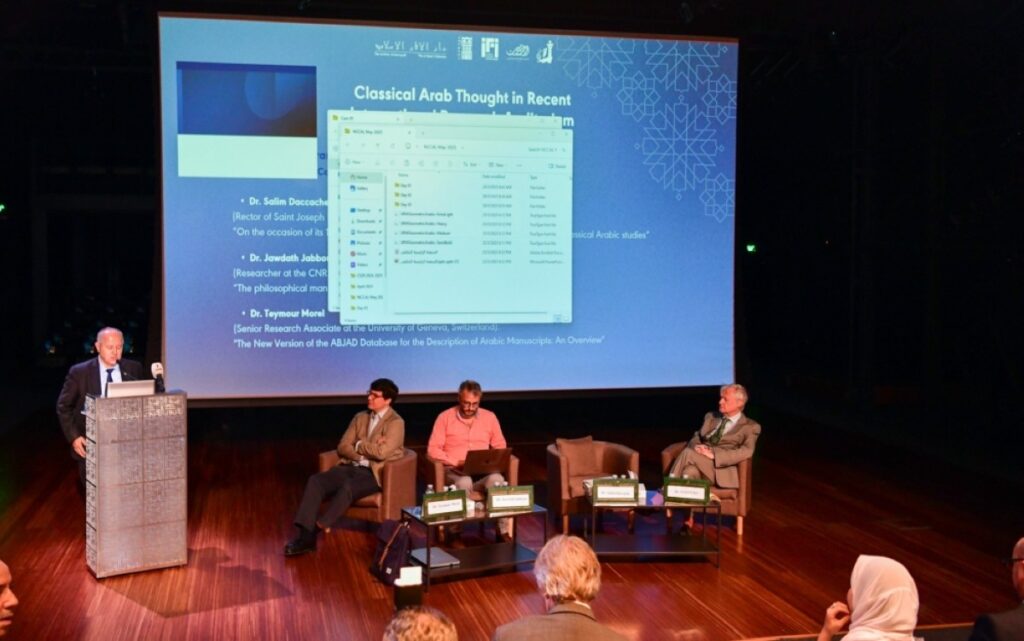KUWAIT: The international forum titled “Classical Arabic Thought in Contemporary Global Research” commenced on Monday at the Yarmouk Cultural Center, marking a significant cultural milestone. The event is jointly organized by the National Council for Culture, Arts and Letters (NCCAL), the French Center for Research in the Arabian Peninsula (CERAP), and Dar Al-Athar Al-Islamiyyah. In her opening remarks, NCCAL’s Assistant Secretary General for Culture Aisha Al-Mahmoud described the forum as a “milestone” in Kuwait’s ongoing celebration as the Arab Capital of Culture and Media for 2025. She noted that the event sheds light on the evolving landscape of classical Arabic thought and its renewed relevance in contemporary academic research.
Al-Mahmoud emphasized that recent years have witnessed a “qualitative renaissance” in the study of Arab intellectual heritage, pointing to the adoption of modern analytical methodologies that explore both the historical and social contexts of classical texts. She added that the forum brings together a diverse group of scholars from leading Arab and international institutions, promoting dialogue and academic cooperation in the fields of philosophy and intellectual studies.
Expressing gratitude to all participating institutions, Al-Mahmoud affirmed that such events reinforce Kuwait’s cultural presence regionally and globally, while bolstering scientific research in heritage and knowledge. French Ambassador to Kuwait Olivier Gauvin also addressed the gathering, underlining the importance of cultural and academic collaboration between Kuwait and France. He praised the existing partnership between NCCAL and CERAP, and highlighted the role of joint initiatives in preserving Islamic heritage and fostering mutual understanding.
Gauvin described the forum as a pivotal moment in Franco-Kuwaiti relations and referenced the French Institute for Islamic Studies—established by the French Presidency—as part of France’s broader efforts to deepen understanding of Islamic culture. He noted that the conference supports this vision by convening prominent experts in manuscript preservation and philosophical research.
The ambassador also drew attention to the vast corpus of Arabic manuscripts housed in European institutions, including over 7,000 in the French National Library alone. He lauded the researchers contributing to the cataloguing and analysis of these works, emphasizing the significance of preservation efforts for this shared intellectual legacy. Highlighting Kuwait’s longstanding role in cultural dialogue, Gauvin noted the country’s pioneering stance in supporting critical thought and cross-cultural exchange—particularly in light of its 2025 designation as the Arab Capital of Culture and Media.
Dr Pierre Cayle, Director of the French Institute for Islamic Studies, echoed these sentiments, stressing the role of joint academic endeavors in renewing knowledge and deepening intercultural understanding. He noted that research into classical texts opens new horizons and contributes to the preservation of a common human heritage. Also speaking at the event, Dr Makram Abbas, Director of CERAP, outlined the forum’s key themes, which include the preservation of manuscripts, library collections, and critical heritage studies. He highlighted recent scholarly discoveries that have prompted a reassessment of traditional interpretations, offering new insights into Arab intellectual traditions.
Dr Reem Al-Rudaini, the forum’s host and Associate Professor of Islamic History at Kuwait University, pointed to the dynamism that has recently characterized research in classical Arabic thought. She noted that the breadth and diversity of scholarly work—spanning philosophy, science, literature, and beyond—represent a growing and significant phenomenon that merits comprehensive academic attention. The three-day conference features a series of scientific sessions dedicated to the indexing, investigation, and reinterpretation of key manuscripts and intellectual works within the broader context of Arab and Islamic civilization. — KUNA

